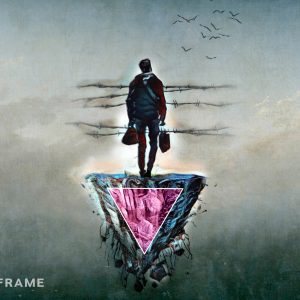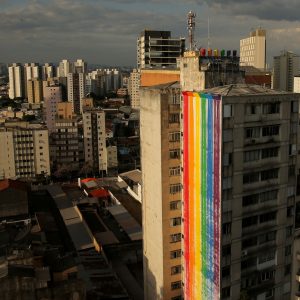Fighting for queer life to be visible and just
Though queers enjoy some legal protections in certain parts of Africa, more often they are persecuted and their existence decried or denied. The fight for their rights needs a global stage.
Author:
27 September 2021

The 5th Pan Africa ILGA regional conference, held under the auspices of the International Lesbian, Gay, Bisexual, Trans and Intersex Association, a worldwide federation of 1 730 member organisations, took place at Constitution Hill in Johannesburg in August. Up to 1 000 delegates from all five regions of the African continent and the international LGBTQIA+ community logged in daily to follow the proceedings via Zoom.
Due to be held in Ghana last year, the conference was postponed because of Covid-19 as well a homophobic backlash resulting in a draconian anti-gay bill in that country. The criminalisation of LGBTQIA+ people is legislated in 32 African countries.
Retired judge Edwin Cameron, who served as a justice of the Constitutional Court, was one of the speakers on the opening panel.
Melody Emmett: What is the relevance to the LGBTQIA+ movement of basing the Pan Africa ILGA conference at Constitution Hill?
Edwin Cameron: There are several important significances. One is the recognition that, at least in constitutional and statute law, South Africa is the first country to embody equal protection for LGBTQIA+ persons, whom I call queers as a proud self-appropriation of a derogatory term.
Second, it recognises the symbolic importance of Constitution Hill to the entire rule of law and constitutional project in South Africa, which in turn has great significance for the rule of law and constitutionalism not only in Africa, but elsewhere where it is under threat, for example, in Poland, Hungary, Colombia and Brazil.
Third, holding the conference at Constitution Hill reminds us that although these are said to be international issues, and they are, South African queers are not mindful enough of that. We tend to be narrow and parochial and inward-looking. In very practical terms, this is a problem because for as long as one of us is not free, none of us is free.
Related article:
[Consider the] persecution of LGBTQIA+ people on our borders; the lack of equality in Namibia; the attorney general’s appeal against the high court judgment striking down anti-queer laws in Botswana; the continued persecution of queers in Zimbabwe; and the criminal provisions still in place in Lesotho.
Countries like Mozambique, Angola and Mauritius have decriminalised [being queer] in the past few years. They are a point of light amid the persecution, violence, oppression, ostracism, indignity and life-threatening dangers that are happening in other countries on the continent. And, of course, it is also an issue in Hungary and Poland and the Caribbean and in many Middle Eastern and North African states as well.
So holding the conference here was saying let’s see this for the worldwide issue it is, and let’s see the impact that South Africa’s constitutional and legal breakthroughs had and can still have.
Emmett: Laws must change, but so must social attitudes. Can you comment on this?
Cameron: Exactly, both must change, not necessarily in tandem. Obviously you can start with either, but you have to have legal protection and you have to have social activism addressing social attitudes.
Emmet: The piece-by-piece dismantling of homophobic legislation seems to be quite common elsewhere in Africa. How does this compare with South Africa?
Cameron: Yes, that is exactly how it is in many other countries, but starting from the first Mandela Parliament in 1994, there was a fairly thorough review of anti-queer laws. So apart from some issues that still affect transgender people, in almost every respect our statute book has been cleansed of anti-queer discrimination.
Emmett: Why is it important to talk about reclaiming the past, and what past is being reclaimed?
Cameron: That is such a critical question. For two and a half millennia, we have been obliterated from humanity. We were immoral, we were sick, we were unbiblical, dangerous, predators. For most of human history, the facts of queer life – the proud facts of our contribution to humanity, of our loves, of our losses, of our griefs and of our joys and our achievements – have been obliterated.
Relatively recently in Western Europe, North America and elsewhere in the world, and joyfully also now in Africa with ILGA, we are saying no, we have always been here. We will not be obliterated.

A particular lie that affects us as Africans is that people like me – white people, white colonists – imported homosexuality. My mother’s Schoeman forefather came to Africa in 1704, and the idea is that he brought a little package of queerness with him into Africa. It is complete rubbish, of course, but it’s dangerous, life-threatening rubbish. There have always been same-sex-oriented, gender-diverse people in Africa. There have been healers, lesbian sangomas and transgender people living safely within African communities. We are reclaiming that.
Emmett: What is most promising about a Pan-Africa LGBTQIA+ event like this?
Cameron: It’s twofold. It’s recognising the commonality of our issues – we all face the vicious lying that this is a white colonial import, and we all face the issues of monotheistic misrepresentation and misinterpretation in the texts of Judaism, Christianity and Islam, and we all face continuing stigma and ostracism.
And then, second, it’s to recognise that by pooling our ideas we emerge stronger. For example, on the panel I made a suggestion to Ghanaian activists who are battling against the horrific draft legislation there, perhaps the worst homophobic legislation ever together with the Nigerian statute of 2014, the Same Sex Marriage (Prohibition) Act. I said what are the leading Ghanaian lawyers doing and saying about this? They can’t hide out. Many of them are now partners in posh law firms in Sydney and London and Washington DC and Los Angeles. What will their law partners say if they support the proposed law, or even keep quiet about it?
Many of these same lawyers are members of the International Bar Association and the International Commission of Jurists, or the Commonwealth Law Association, all of which have taken – quite rightly – stands against the persecution of queers. Where do those lawyers stand? They must speak out.
And if they want to skulk within the lucrative coteries of international partnerships, Ghanaian activists should write to the head partner of the firm or write to the international law organisations and ask them to intervene.
The same with accountants, the same with doctors. Is there a doctors’ association in Ghana that has taken the lead? If not, why not?
It’s about the pooling of activist histories and the energies of principled activist rage.
Emmett: Is the collective trauma of LGBTQIA+ people being adequately addressed?
Cameron: Making a commitment to activism is in itself a significant counter-traumatic resolution. To stand up and say I am no longer going to be shunned; I am no longer going to be persecuted; I am going to join an activist group.
That doesn’t necessarily entail leaping out of the closet waving flags. It might mean confiding in a friend or your family. But the very fact of coming out is in itself counter-traumatic. Activism starts with visibility.
The unique fact about queer people is that we are everywhere but we are just not seen – 7% to 10% of humanity, however defined, can be classified as queer.
Emmett: Are LGBTIQ+ activists learning from successes and failures in other countries?
Cameron: Definitely, but what the Kenyan activist on the panel with me said was very important. He said, “We mustn’t patronise people simply because we don’t know what they are doing.”
I don’t like to see this as only an African problem, so to move away from Africa, let me say the Hungarian draft bill [banning schools from using LGBTQIA+ content] is terrifyingly like the 1986 statute that Margaret Thatcher enacted; it was only repealed in 2003. Thirty-five years later, the Hungarian statute says “you can’t taint our young people’s minds”. So in a way history is repeating itself, but we are also learning from history how to fight against these things.
Related article:
Emmett: Can you elaborate a little on the point you made at the conference about the personal being political?
Cameron: Homosexuality and gender variance are about sexual functioning, which has always been attended by taboo and stigma and repression. So when I tell you that I am a proudly gay man, I am telling you something very intimate that doesn’t need to be said by heterosexual people, because it is assumed. I am telling you something that controverts all your assumptions about humanity. So when I come out, even to my best friend, I am taking a political step, which is to say I want to change the world, I want to change your assumptions about me and about humanity. It’s as elementary as that.
Emmett: What does the Pan Africa ILGA movement need going forward?
Cameron: A new sense of resolve, of affirmation and of practical, conjoined planning – in Ghana, in Namibia, in Zimbabwe, in East Africa, in Morocco. When I left Constitution Hill, I felt affirmed by hearing other activists, so it’s affirmation, it’s new resolve and it’s new practical commitments, new thoughtful strategies.
Emmet: Are you talking about cross-border strategic planning to tackle legislative issues in different countries?
Cameron: Our panel didn’t address that, but yes, I would like that to happen. My difficulty is that with my prisons duties I am a part-time activist and a voice, but I haven’t actually been in practical queer strategic planning for quite a while. But I think it is begging to be done.
Emmett: Do you imagine playing an advisory role?
Cameron: If needed and asked, yes, I would to the extent that my prison and other commitments allow that. I am very keen to be available.
Emmett: From discussions at the conference, what immediate actions would you advise?
Cameron: Ghanaian – and other pan-African activists – should right away find out which major international law firms have Ghanaian partners, find out whether any of those partners have supported this bill, and find out whether any of those partners have said anything against the bill. If they have not said anything against the bill, find out who they are and why.
Then find out who their senior partners are and challenge them, and if there are Ghanaian queers in New York or Sydney or in London or in Los Angeles, ask them to find out where the offices of those firms are and organise a demonstration. It sounds trivial, but that’s how change starts.
Related article:
Emmett: What is needed by the LGBTQIA+ movement in South Africa?
Cameron: We need a new sense of resolve and we need new alliances and partnerships. We must understand that the fact that we have such widespread gender-based violence stems from the very same fundamental sources from which homophobia stems. That is, the privileged position of males and their assertion of an entitlement to exact power, accompanied very often by violence against women and gender non-conforming people. So I think there is a lot that still needs to be done.



